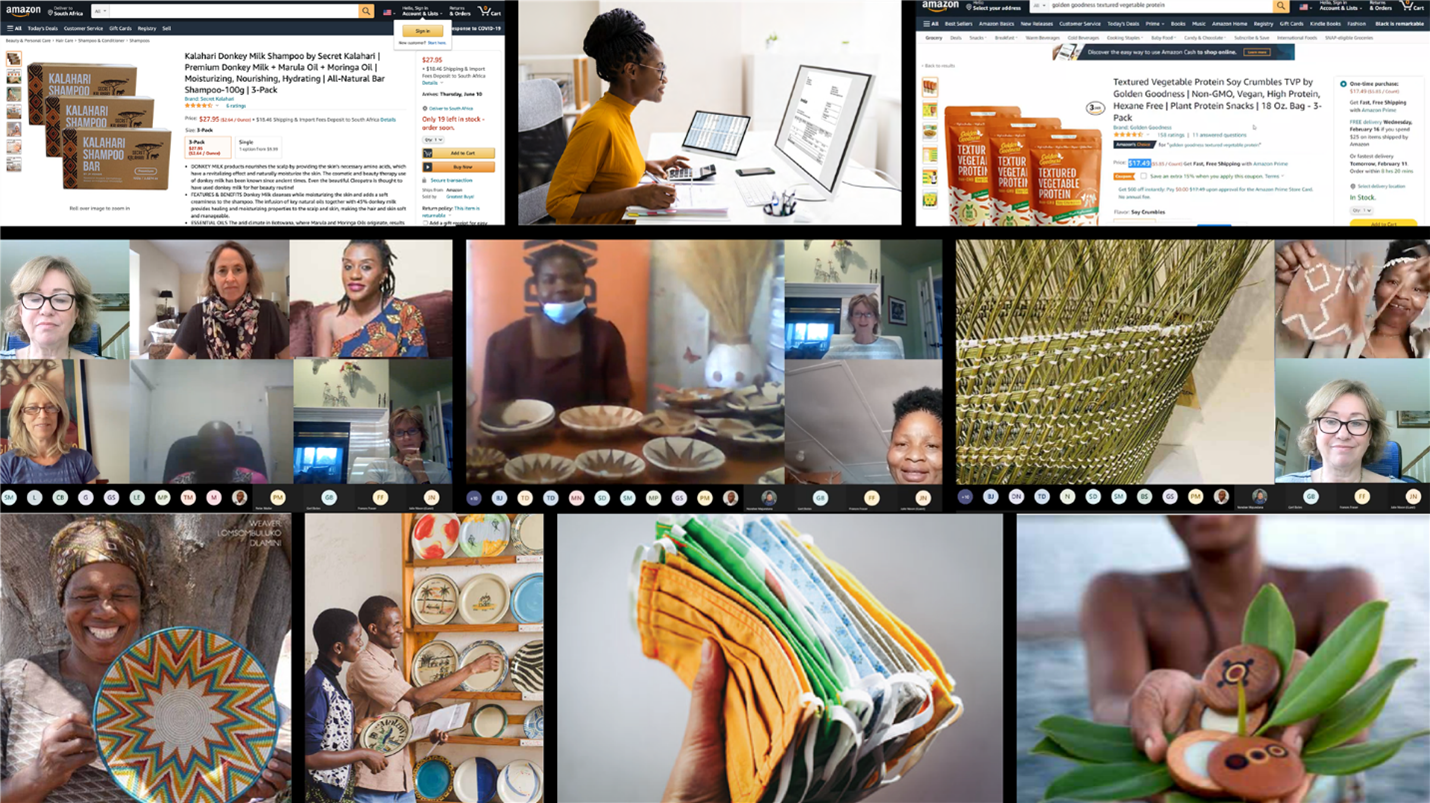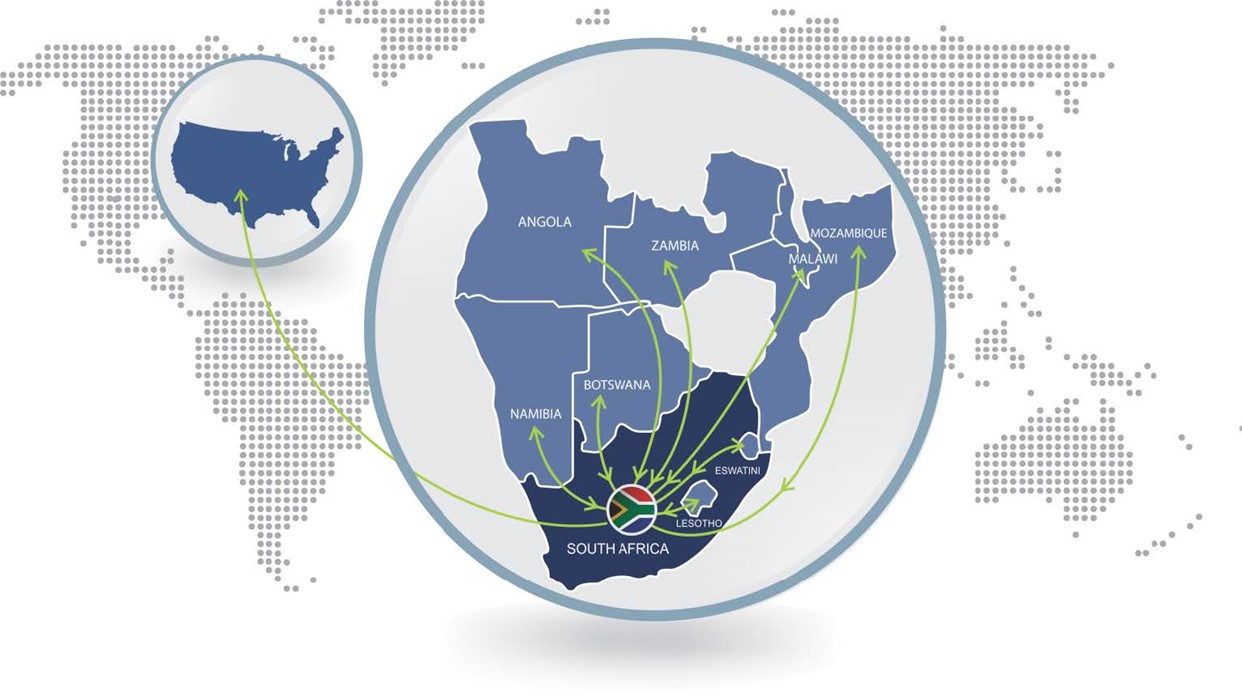Let us know what type of content you'd like to see more of. Fill out our three question survey.
Digital Trade in Southern Africa: How Firms Have Adapted to Digital Trade During COVID-19
Mar 24, 2022
Throughout the COVID-19 pandemic, companies in Southern Africa—like elsewhere in the world—have been forced to adapt to remote working: moving their business and communications online, conducting virtual business to business (B2B) meetings, and attending online trade expos and webinars. Between September and December 2021, DAI’s Center for Digital Acceleration worked with the USAID Southern Africa Trade and Investment Hub (USAID TradeHub) to understand how these businesses have adapted, what the long-term effects of the pandemic might be, and the support that firms need to adapt to the new normal. During this study, we spoke to three types of firms:
- Exporters: A firm—in the case of the USAID TradeHub, in Southern Africa—that sells its goods to a market other than its national domestic market.
- Buyers: An entity (firm, person, or association) that purchases goods from a vendor—in the case of the USAID TradeHub, the vendor is an exporter from the Southern African region. These firms may be based in the region or in the United States.
- Trade promotion service providers (TPSPs): An organization (public or private) that provides services to assist firms to trade—and in many cases, export—their products. Services include supporting firms to meet market entry and buyer requirements, supporting trade investment events where firms showcase their products and meet buyers, identifying demand and potential buyers and creating mutually beneficial relationships between exporters and buyers for long-term business.
The study looked across numerous sectors, including cosmetics, agriculture, and handicrafts. USAID TradeHub works with TPSPs, buyers, and exporters across southern Africa (see map), and with U.S.-based buyers and TPSPs. The full report is available here, and in this blog, we summarize some of our key findings.

Photo: USAID TradeHub.
Exporters Need to Improve Their Digital Skills to Keep up With the “New Normal”
Most exporters do not believe that their digital skill level is a challenge to operating online. They also recognize that during the COVID-19 pandemic, everyone is learning to adapt at their own pace. Exporters are most concerned with their online presence, particularly their ability to conduct marketing on social media or the quality of their websites. Some smaller, or more nascent exporters do not have the necessary equipment (e.g. laptops, webcams, or video production equipment) to build a professional online presence or engage fully in buyer meetings and other online events. Despite limited connectivity infrastructure in the region, most firms did not report connectivity to be a barrier to online collaboration.
However, TPSPs report that exporters should improve their digital skills to meet the needs of the market and need to foster a better understanding of sector-specific market trends resulting from increased digitalization. They note that there is a clear need to support exporters to reach adequate levels of professionalism in their online interactions. TPSPs could play a valuable role in addressing the skills gap, for instance through providing digital training curricula for exporters. Our research suggests that sharing sector-market trends resulting from digitalization with exporters could encourage them to develop their digital skills and online presence.
Increased Access to Information Has Been a Key Benefit to Operating Online
Exporters and TPSPs gave overwhelmingly positive feedback on the informational webinars provided by USAID TradeHub. They value the opportunity to learn at no cost and from their own office or home, noting that they would not have attended such events online pre-COVID-19. For instance, exporters reported that the webinars introducing them to certain buyers and e-commerce platforms were useful, and they appreciated events where they were able to learn specific export requirements for their sectors. Not only is the provision of this information clearly vital, but it is also important that this information is presented by trusted, neutral parties.

Photo: Coverage of USAID TradeHub. As part of its objectives, the program supports increased exports from the Southern Africa region to South Africa and the United States as destination markets.
Smaller Online Events Are Far Superior to Large Trade Expos
There is consensus among all our interviewees that the move from large, in-person events to online trade expos has not been successful. Only a few exporters reported attending large online trade expos, with most noting that they were difficult to navigate or too time-consuming. TPSPs report that organizers of large online trade expos don’t provide sufficient support to help attendees navigate the platforms and participate fully. For example, many event organizers left buyers and exporters to network without guidance or structured networking sessions.
Buyers report that smaller B2B events are more efficient for them than larger trade expos or traveling to numerous sites for B2B meetings. Virtual B2B meetings are also deemed the most effective form of digital collaboration, particularly when combined with digital skills-related support to exporters. Indeed, TPSPs report a faster sales turnaround for exporters that attend targeted B2B meetings, compared to those attending larger (in-person or online) trade events.
The Future is Hybrid
There was consensus among interviewees that, while in-person interaction is often superior, digitalization of trade-related engagement is likely to continue even after the pandemic recedes. Exporters recognize that they must adapt to the new normal, which they see as a hybrid of in-person and virtual interactions. Most exporters prefer in-person engagement, but they also believe that online events and meetings can still be a helpful complement. While there is clearly an appetite for the continuation of both in-person and virtual interaction between exporters, buyers, and TPSPs, blended models do not seem to be common. Potential models to address this need might include blended online and in-person engagement, such as hosting virtual tasting events or setting up physical sample rooms along with remote pitch sessions.
In-Person Interaction is Vital to Building Relationships and Trust
One of the main barriers to conducting business online for both buyers and exporters is the difficulty in relationship building, particularly in assessing the credibility of the potential business partner and building trust between parties. Many prefer in-person interaction, which allows them to better assess the “seriousness” and genuineness of potential business partners and confirm quality of product. All interviewees agreed that relationship building virtually can take significantly more time than doing so in person.
Here are four ways trust-building can be expedited online:
- Third parties can facilitate trust-building: Exporters and buyers report that having USAID TradeHub and/or TPSPs linked to the event or engagement confirm that they are being connected to genuine and credible potential partners.
- Information-sharing and increased transparency can increase trust: The more information an exporter can provide to buyers, the better. This includes providing as much detail on the business and product as possible and being in regular communication throughout the business cycle.
- Mutual understanding of the time taken to make a deal: There is evidence of frustration at the amount of time it takes to foster effective relationships online. Developing a clear lifecycle that takes exporters and TPSPs through the typical stages of virtual business deals and their expected timelines could ensure that all stakeholders are on the same page when estimating time taken to make these connections.
- Exporters need to build their digital skills and online presence: A polished online presence helps exporters demonstrate credibility and professionalism to potential buyers.
Since 2016, the U.S. Agency for International Development (USAID) Southern Africa Trade and Investment Hub (USAID TradeHub) has engaged with partners across the region to increase sustainable economic growth, global export competitiveness, and exports from targeted Southern African countries to the South Africa and U.S. markets. USAID TradeHub works with market actors to identify and resolve enterprise constraints and to implement sustainable solutions through market-based trade and investment facilitation services. The program has a focus and presence in nine target countries: Angola, Botswana, Eswatini, Lesotho, Malawi, Mozambique, Namibia, South Africa, and Zambia.